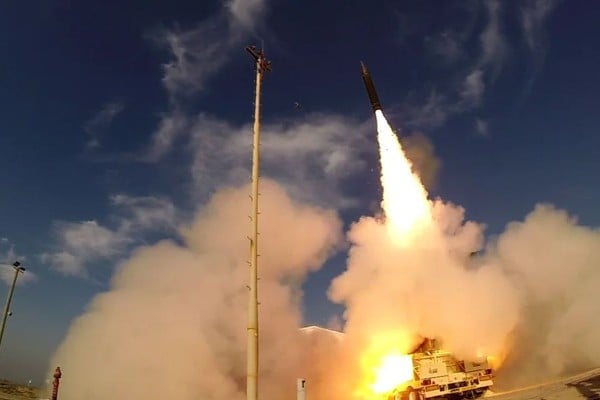The unit would represent a shift toward enhancing Israeli attack capabilities through land-based missile systems.
By Yaakov Lappin, JNS
Iran’s April 14 attack on strategic Israeli sites including the Nevatim F-35 air base was successfully stopped by an extraordinarily capable multi-layered air-defense system and assistance from allied militaries, but still serves as a reminder that Israeli air bases are a prime target for both Iran and its Lebanese Shi’ite proxy, Hezbollah.
Hezbollah, which has more firepower than most NATO militaries, will certainly attempt to saturate Israeli air defenses and target airbases in any future full-scale conflict with Israel.
On Tuesday, Hezbollah claimed it had targeted an Iron Dome air defense battery in northern Israel with suicide drones.
The potential establishment of an “Israel Defense Forces Missile Corps,” perhaps under the Israeli Air Force or the IDF Artillery Corps, would represent a significant shift toward enhancing Israeli attack capabilities through advanced, land-based missile systems.
These would both partially ease the very intensive workload of the IAF, and create redundancy options for Israeli firepower capabilities.
According to an April 10 report in Aviation Week, citing an American defense official, the IAF’s 39-jet fleet of F-35Is “have surged to more than five times normal operations since the Oct. 7 attacks by Hamas and have sustained that level with the help of international support.”
The report added that the Israel fleet of stealth fighters saw a “565% jump in monthly average flight hours over a six-month period.”
“By moving to three shifts for nonstop operations, Israeli maintainers and contractor field service representatives have allowed the Israeli Air Force to continue flying F-35Is at a rate of 35-39 jets a day,” the report said, giving an indication of the IAF’s workload even prior to the April 14 attack.
The first advantage of a ground-based Israeli missile corps would be reducing at least some of the workload currently facing the IAF.
In addition, ground-based missile units offer rapid response—operational within minutes—alongside minimal crew requirements for operation and maintenance.
Vitally, creating more such missile bases would also give Israel alternative strike options in the event that an enemy manages to impair the country’s air bases (despite the fact that the IAF is confident in its ability to rapidly repair runways and other air base infrastructure).
The introduction of a dedicated missile corps would complement the manned and unmanned array of fighter jets, combat helicopters and unmanned aerial vehicles, with UAVs able to help direct the fire of the missiles.
Diversifying Israel’s strike mechanisms and dispersing strategic risks would be the main benefits of such a move.
The IDF is already equipped with a range of surface-to-surface guided rocket and missile systems.
Israel’s adversaries have claimed, without corroboration, that such missiles have already been used.
For example, in May 2022, Syrian state media claimed that Israeli surface-to-surface missiles were used in a strike on a target near Damascus, and that the missiles were fired from the Golan Heights.
It seems safe to assume that many of the systems offered by Israeli defense company Elbit Systems are already integrated into the IDF.
The government-owned Tomer defense company stands as the backbone of these developments, acting as the country’s rocket propulsion knowledge center and having a hand in developing these sophisticated systems.
Elbit’s products include the autonomous artillery rocket system called Precise and Universal Launching System (PULS), with which, according to Elbit, “there is no need to move artillery units based on the required firing range; the versatile solution can fire a variety of ammunition types to various ranges from the same position, to ranges of up to 300 kilometers [186 miles].”
In addition, the Accular is described as a “highly accurate, combat-proven guided rocket designed to support ground forces. The artillery rocket addresses urban warfare requirements and the need for near-real-time responsiveness. Accular can neutralize targets to a range of up to 40 kilometers [25 miles] and is especially required in areas where the use of traditional artillery is limited by terrain, distance and accuracy.”
Other products include the Extra artillery rocket, which has a range of 150 kilometers [93 miles] and which travels at supersonic speeds, and the Predator Hawk long-range strike rocket, which has a 300 kilometer [186 mile] range.
Israel’s long-range ballistic missile capabilities remain classified.
According to international media reports, they include variants of the Jericho ballistic missile (types 1 through 3) and submarine-launched Popeye cruise missiles.
An independent IDF missile corps is both timely and necessary.
Recent events suggest that while air defenses have never been more important for guarding Israel’s attack capabilities, relying primarily on aircraft for strikes may be placing too many eggs in too few baskets.





